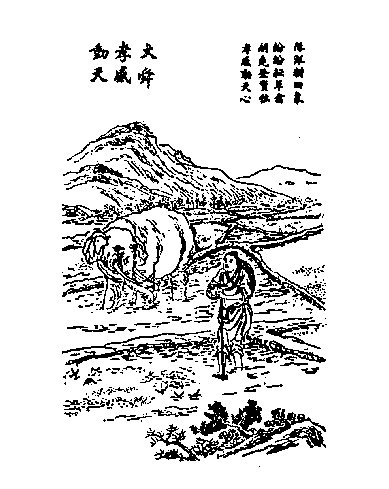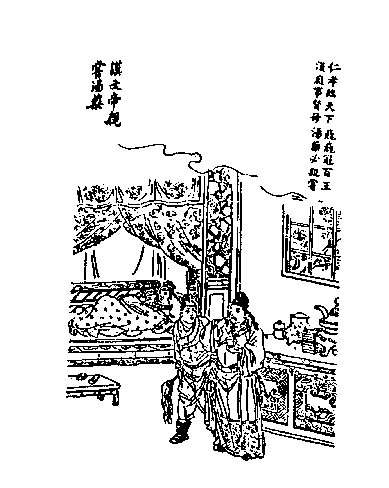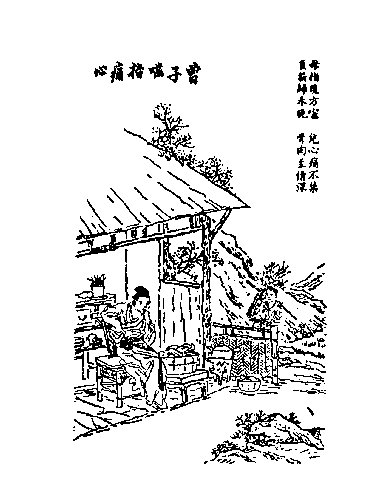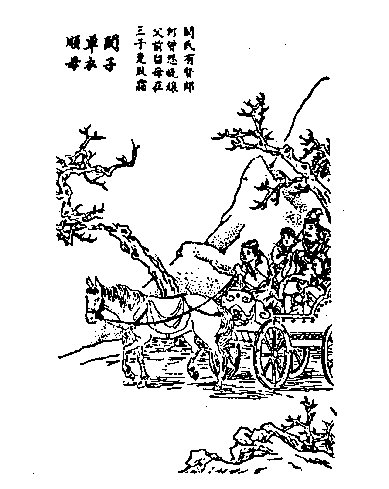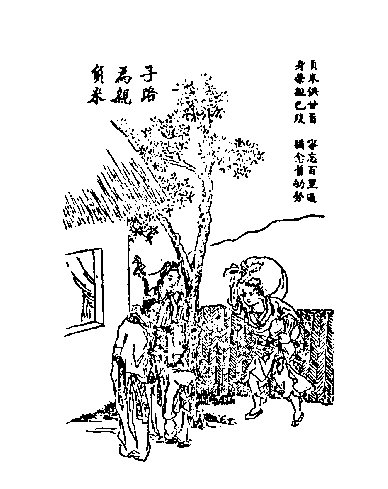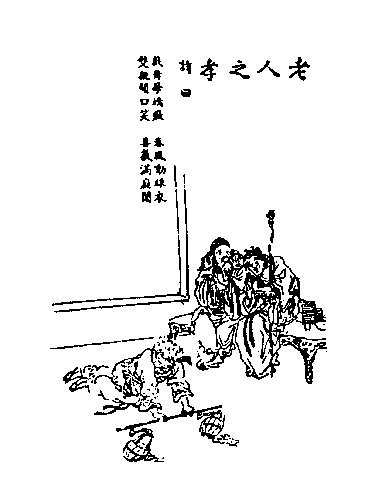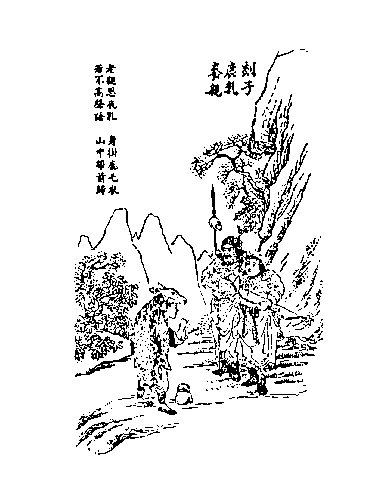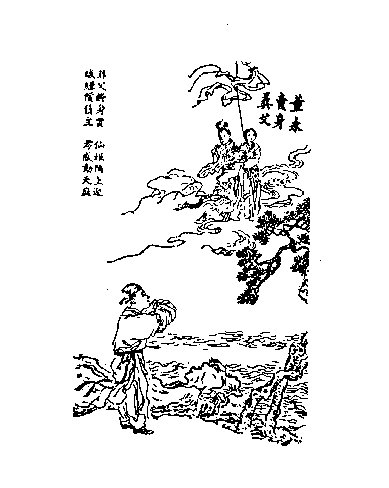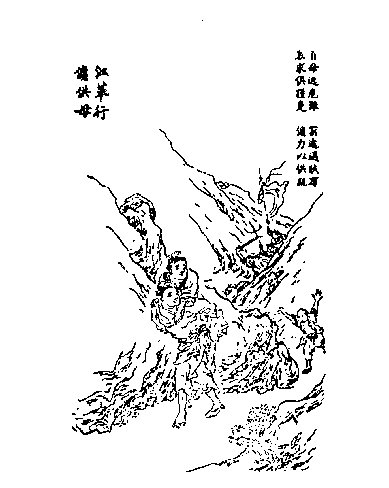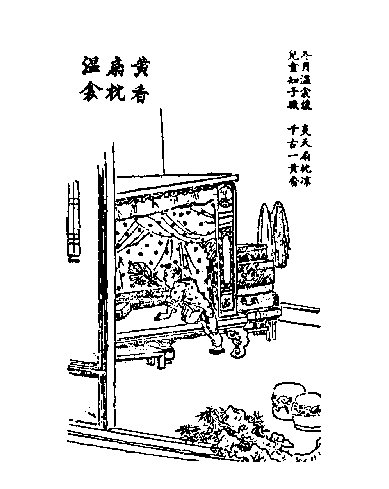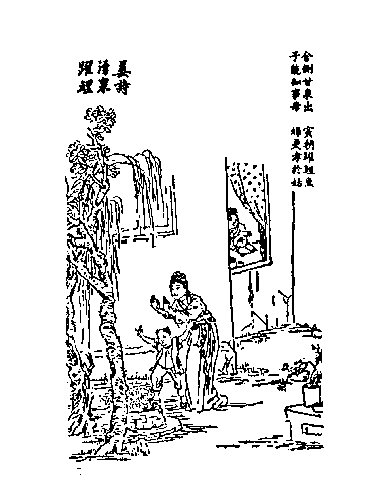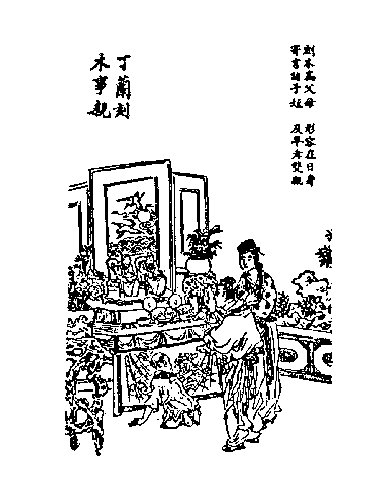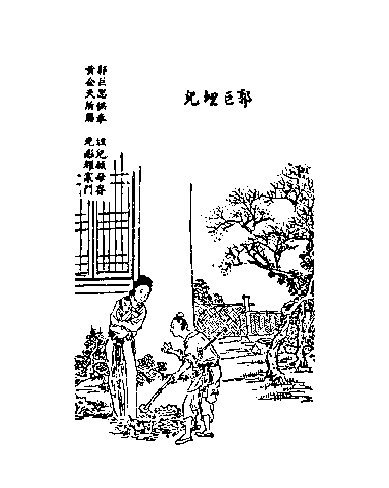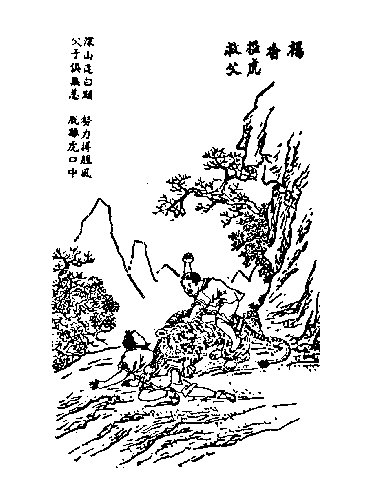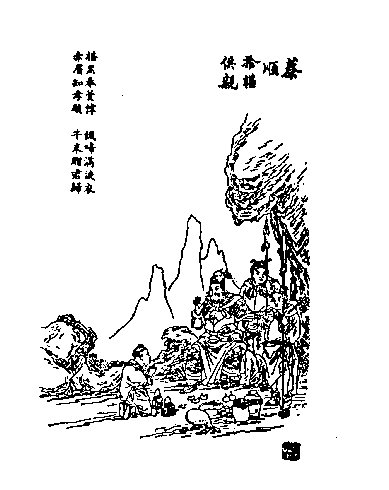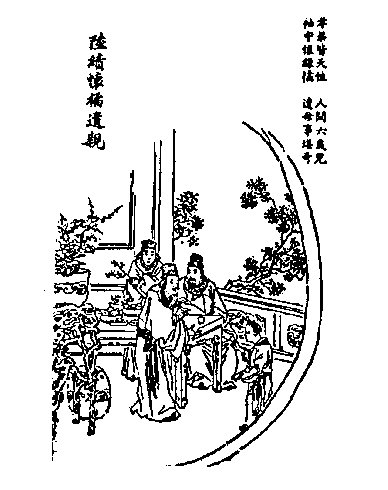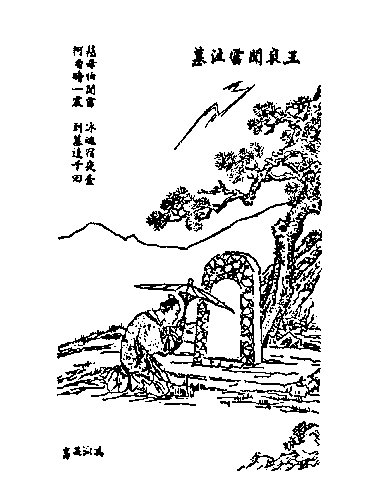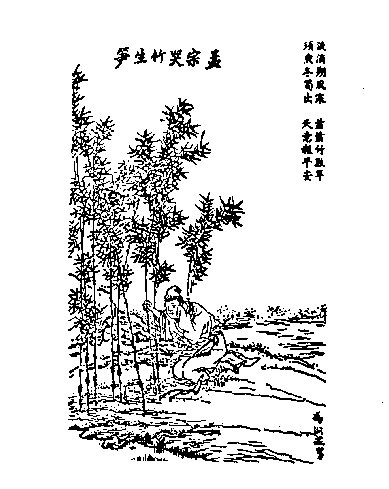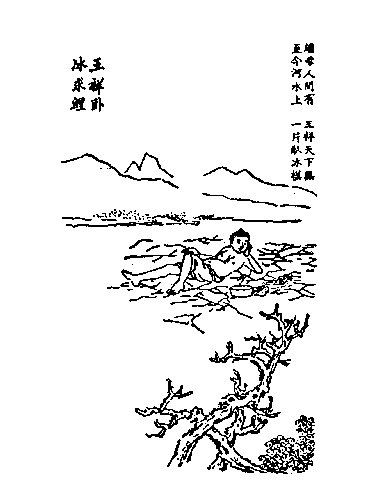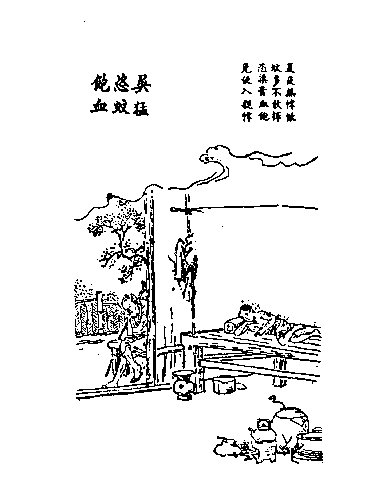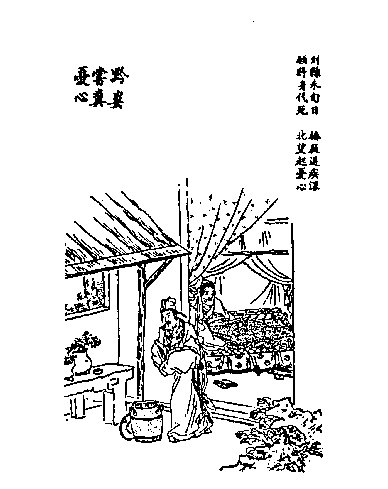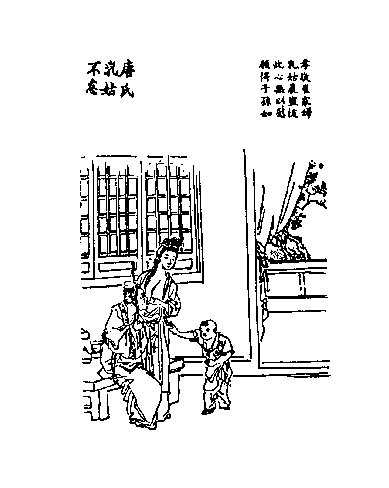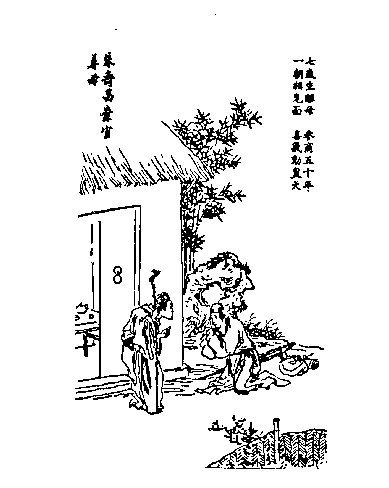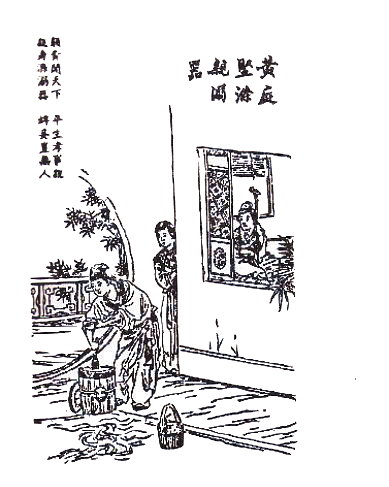144 Twenty-Four Stories of Filial Piety
with Pictures and Poems
CW43_No.144
Translated and edited by the Buddhist Yogi C. M. Chen
1. Filial Piety of the Emperor Shun (2255 B.C.)
With a blind father, a haughty mother, and a proud brother, he lives among such an unfortunate family. He is agreeable to all of them through his filial piety. He serves them humbly and faithfully. He is inspired by the Buddha who sends an elephant to help him plough and birds to help take up all the weeds. This is heard of by the Emperor Yao who selects him as his successor.
Alas! Nowadays the President is selected by the largest majority of fools who are scarcely not cheated by those ambitious persons.
Elephant helps him to plough,
Birds help him to pick up weed.
From filial piety inspired by God
Could those animals but pay such heed!
2. Filial Piety of the Emperor Ham-Van (179 B.C.)
His mother has some diseases and suffers greatly for three years. The Emperor Ham-Van has many servants, maids, attendants, and concubines, but feels he must serve his mother personally without sleeping. All kinds of medicines and decoctions he tests on himself first. He is inspired by Buddha who helps him not only with the recovery of his mother but also with keeping the peace of his kingdom over a long period of time.
Nowadays Presidents cannot be filial to their parents, so how can they help their people to live in peace? That is why war resounds from here to there!
Controlling his Kingdom with filial piety,
Among all the Chinese Kings he is the best.
He serves his good mother at Ham Palace,
When she is sick, her medicine he must test.
3. Filial Piety of Tseng Shen (1122 B.C.)
Tseng Shen is poor and has to get wood for fuel from a mountain. Once when he is on the mountain, a visitor comes to his home. His mother does not know how to treat the visitor, so she bites her finger. Tseng Shen suddenly receives some vibration and feels pain in his heart. He immediately is vigilant and says to himself, "My mother is calling!" No later his action than his thought, and he returns home.
The statistics of children running away from their parents increases every year. Their mothers, even by cutting off their heads, cannot call their children back. A vibration happens only from one good heart to another good heart.
Mother bites her own finger though at home,
He is on the hill but yet feels pain.
He does know it is his mother's call,
Quickly returns and finds it so happened!
4. Filial Piety of Min Sun (1122 B.C.)
Min Sun's mother died. His stepmother then gave birth to two sons. She made new wadded coats for her two sons but gave nothing to her step-son. When his father found this out, he wanted to divorce her. He advised his father by saying: "If you keep my stepmother it is I alone who feel the cold; if you divorce her, we three altogether will get cold." His father takes his advice and the step-mother changes her attitude.
Nowadays many such cases happen, but none are like Min Sun.
His father does want to divorce,
For the reasons she treats him worse.
But he says, "Keep step-mother with me,
Lest, not only one are cold but three!"
5. Filial Piety of Chung Yu (1122 B.C.)
Chung Yu is poor and takes only herbs for himself but gets rice from a long distance for his mother. Afterwards he is engaged in an office and becomes rich, but his mother dies. He feels very sad and says to himself: "Better to eat only herbs myself with mother alive. What a pity to eat rice without mother!"
One should know that to have a mother to serve is a very good fortune. May those who still have their mother alive, honor her in time.
He borrows rice for his mother,
He forgets the distance is so far!
When he becomes rich but mother dies,
He still thinks of the favor of his Ma!
6. Filial Piety of Lao Lai (1122 B.C.)
When Lao Lai is seventy, his parents are still alive. He wants to give them cheer and makes them laugh daily. Sometimes he holds some water, passes before his parents, purposely falls down; sometimes he wears the clothes of a clown and makes much fun in front of his parents; while other times he assumes the form of a child and plays beneath his parents' knees.
It is only the sage with filial piety who never loses the innocence of a pure child!
To give his parents cheer
He plays as clown so dear.
Sometimes he assumes a fall,
His parents laugh at the doll.
7. Filial Piety of Yen Tzu (1122 B.C.)
Yen Tzu's parents are old and have eye trouble. The doctor recommends treating them with deer milk. Yen Tzu wears the fur of a fawn to assume the form of a child of a deer. In this way he really gets some milk. His parent's eyes feel better. He has to get more again. Once he meets a hunter who mistakes him as a real fawn and is about to shoot him. He cries loudly and tells the hunter the truth and so is saved.
Nothing cannot be gotten by a son with filial piety. Readers will find some more examples in this small booklet. It is not that those good sons really possess supernatural powers but that they are always helped by the Buddhas, Bodhisattvas, Gods, and All Protectors.
His parents do like to drink the milk of deer,
They do not know the price of it's dear.
He must wear the fur of fawn,
Almost is killed by the hunter with fear.
8. Filial Piety of Tung Wen (176 B.C.)
His father dies but Tung Wen has no money to bury his father. He therefore sells himself as a slave to a rich man. While on the way to the rich man to work, he meets a kind girl who begs to be his wife and who wants to work as a weaver at the rich man's house in his place. After she repays his debt, she then says goodbye to her husband and flies up to the Heaven. He then begins to know that she is no common vulgar girl.
Many would like to have a fairy girl as their wife but very few can be true filial sons.
No money to bury his father,
As a poor slave he sells his body.
With weaving work, she returns it for him,
She is sent by God, a fairy Lady.
9. Filial Piety of Chaing Ger (176 B.C.)
Chaing Ger is very poor. When his home town is caught in a civil war, he carries his mother to try to escape. On the way they meet robbers. He begs those robbers for mercy with tears. At that time, those robbers are not like, they are not so cruel. Because they do not have the idea of class struggle, they still have a good conscience. Chaing Ger's filial piety inspires them and both mother and son are set free.
He carries his mother to escape the war;
He meets robbers on the way so far.
His filial piety makes all robbers kind,
At last they both are saved, he and his Ma.
10. Filial Piety of Huang Shon (176 B.C.)
When Huang Shon is nine years old, he knows how to serve his parents. His mother dies before his father. In hot weather he fans his father's bed to make it cool before his father sleeps. And when winter comes, he first sleeps in his father's bed in order to make the bed warm.
This story was told in every Chinese family, but very few follow such a good example. Children now under Maoism are trained by the party to spy on their own parents.
In winter he makes his parent's bed warm;
In summer he makes his parent's bed cool.
A young child can know to be filial,
Though long time's passed, only Huang Shon is so called.
11. Filial Piety of Chang Shih (176 B.C.)
Chang Shih and his wife both are filial to their mother. His mother does not like the water from the pond, but likes that of the long river which is situated a far distance from their house. He and his wife fetch it in turn for his mother. His mother likes fish too, so they purchase it from the town without tire. Through a long period of patience, their filial piety inspires God and the Dragon King. God helps their health and the Dragon King makes especially for them a small stream pass around their house and fish appear within it daily.
Through filial piety, stream comes out so near;
Through filial piety, fish also appear.
When one's son himself knows how to serve,
Daughter-in-law knows too: who is dear!
12. Filial Piety of Ding Lan (176 B.C.)
Ding Lan's parents died when he was young. He remembers them and feels very sad that he did not serve them. He then engraves wooden images of them and serves those with food daily. After a long time of doing this, his wife feels tired and one day she tries to pierce the wooden image with a needle. Blood really comes out. When her husband returns, the images even weep. Tears fall on the table. He then immediately divorces his wife.
Though the statistics of divorce are ever increasing, I never heard of such a cause for divorce in our age.
He makes images of his parents really;
He serves them as if alive daily.
He says to all people so earnestly,
"You must honor your parents early!"
13. Filial Piety of Kuo Chu (A.D. 265)
Kuo Chu has three sons. His mother reduces her food in order to give some to her grandsons. He then discusses with his wife: "I feel very sad, our mother always spares her food for our sons. She herself does not actually get enough food. You can give birth to more sons. Could you give birth to our mother? Hence, better it is to bury our sons and let our mother have sufficient food." His wife agrees with him.
Three feet deep they have dug in the ground, but instead of burying their sons, they find some large pieces of gold on which it is written: "God of wealth gives this gold to the filial Kuo and his wife!"
I heard of a Vietnamese Maoist who killed his mother to win money. Surely a demon's attitude is quite different from that of a God.
He wants to bury his sons and save food for Ma,
As food is not enough for Ma and three sons.
When he digs the earth, he finds some gold,
Both are saved and the gold shines like sun.
14. Filial Piety of Yang Hsaing (A.D. 265)
Yang Hsaing follows his father and goes to a hill where they meet a tiger which tries to kill his father. He becomes very angry. At that moment he knows only to save his father and is not aware that his age is only fourteen. He uses his whole might, holds the neck of the tiger with his left hand, grasps the tiger's loins with his feet and strikes it's head hard with his right hand. Thus he struggles with it for a little while until the tiger runs away and let them, father and son, both free.
To struggle with a tiger in order to save one's father is reasonable.
When he follows his father to a hill,
A tiger comes out from a large tree.
The young boy strikes it with all his might,
From tiger's mouth Pa and son are free.
15. Filial Piety of Tsai Shun (A.D. 176)
Tsai Shun's father died when he was young. He is very filial to his mother. During the years of famine, he gathered some mulberries to eat in place of rice. He used to gather two bowls, in one of which he collects black mulberries which are well-ripened for his mother; while in the other he keeps the red ones which are only half-ripened for himself. Once he meets some robbers on the hill. They ask him why he keeps them in separate bowls. He answers faithfully with the truth. The robbers like his good mind and reward him with rice.
The ancient robbers were much better than modern robbers who teach people to be cruel to parents, to strike teachers, to struggle within the party, and to set fire everywhere, internationally, and who never appreciate filial piety.
"Sweet fruit is for my mother" he says.
Robbers hear and praise him as so nice.
He is not only free from all the trouble,
But also gets present of much rice!
16. Filial Piety of Lu Chi (A.D. 222)
When he is six years old, he meets a famous official who gives him two oranges. He does not eat them himself and puts them in his pocket. The official asks, "Why?" He answers: "It is the fruit my mother likes very much, so I keep them for her!"
Usually children ask for fruit and food snacks from their parents only for themselves, and when they grow up they just run away from their parents.
He keeps the orange for his mother
Though he is only six years old.
His sponsor has doubt of his lust,
He says, "For my kind Ma I hold."
17. Filial Piety of Wang Pou (A.D. 265)
Wang Pou's mother had great fear of the sound of thunder. When she dies and the voice of thunder happens again, he runs to her tomb and kneels down and calls to his mother saying: "I'm here, please do not fear!" Not only once, but he never forgets to do this throughout his life.
It is not that a dead mother still has fear but that a filial son never forgets that his mother has such a fear. Hence, good karma can be kept in one's consciousness even after his own death.
His Ma is afraid of the thunder;
To be free from the voice, she hides her ears.
When she's dead, he runs to her tomb,
Kneels down and calls his dead ma: "I,m here!"
18. Filial Piety of Meng Tzung (A.D. 222)
Meng Tzung's mother has a certain disease which can be cured as the doctor advises only with bamboo shoots. It is then winter time and one cannot find any bamboo shoots. He then embraces the bamboo and weeps and prays. It is inspired by God and suddenly the earth cracks open and some new bamboo shoots come out. His mother thus recovers.
God answers quickly the filial son, but not to those who are selfish.
His mother is very ill;
It seems to be without hope.
Doctor must treat it with bamboo shoot;
He weeps it out and makes soup!
19. Filial Piety of Wang Shan (A.D. 265)
Wang Shan's stepmother likes fresh fish. In their country at that time there is no such a market in which to buy it. It is winter but to show his devotion and filial piety, he then lies down naked on the ice of the river and prays to Buddha. Suddenly the ice is broken and two vivid fish come out. He then brings the two fish back and cooks them for his stepmother.God answered Jesus' prayer and sent a dollar to him through a fish. All these wonderful inspirations are true. One must believe them. There is no limitation for such things either in the West or East.
There are many stepmothers,
But no such filial son.
On the ice it still remains,
A shadow of him so long!
20. Filial Piety of Wu Mang (A.D. 265)
When Wu Mang is eight, he knows how to be filial to his parents. His family is poor. They have no money to make a curtain to keep all the mosquitoes away. He then lies naked to let all the mosquitoes be satisfied with his blood alone. Hence, no mosquitoes fly to his parents. He says to himself: "All my blood comes from my parents; if this cannot be given to the mosquitoes, how can I do something to honor my parents when I grow up?"
Such a saying from a young boy, ever though more than one thousand years have passed, seems to remain a clear and sweet sound in my ears even now!
He slept with patience and let all his blood
Be fed for those gnats, as much as they had,
For his poor family could afford no curtain.
He fears those gnats would fly to his Ma's bed.
21. Filial Piety of Chien Lou (A.D. 476)
Chien Lou is chairman of a district named Tan-Lin. One day his mind suddenly feels surprised and his body feels full of perspiration and he foreknows that his parents may have some trouble. He immediately takes leave and goes back home. He finds his father is ill. The doctor says: "If your father's stool is bitter, his illness will be cured; if it is sweet, he will die." So the son tastes the stool. It is sweet. He weeps and bows down to the great deity of the Dipper and vows to Him, saying that he would like to die in place of his father. The Dipper turns his fathers life wheel and his father is saved. He himself also lives much longer than his destiny originally deserved.
Doctor says, "Taste your father's stool,
Sweet is danger, bitter is grace."
Aft' testing he knows his father will die;
He asks God, take him to replace!
22. Filial Piety of Mrs. T'ang (A.D. 618)
Mrs. T'ang is a very filial daughter-in-law of Mrs. Tsui. When her mother-in-law becomes old and without teeth, she can neither take meat nor rice. Mrs. T'ang then offers her milk to Mrs. Tsui daily. Many years she does the same without tire. When her mother-in-law is going to die, she calls all her grandsons and granddaughters and daughter-in-laws together and says: "May you all follow Mrs. T'ang's good example of filial piety. You will then be happy and healthy."
When one is filial it makes the whole family happy!.
Mother is old and has no teeth;
With her own milk she always feeds.
Now most youth do not serve the old;
Such a daughter-in-law we need!
23. Filial Piety of Hsiu Chung (A.D. 960)
Hsiu Chung's mother was a step-wife or concubine of his father. She was envied by the first wife and divorced. He has not seen his mother for fifty years. When his father's first wife dies, he is by that time a big official in the palace. He wants to find his mother and renounces his great job. He tries to find his mother at unknown places and tells his whole family that if he cannot find her, he will not return. Through his filial piety and earnest prayer, he receives Buddha's blessing and at last he accidentally meets his mother who is now seventy years old. He invites her back to live with him, and serves her until she dies.Nowadays we find many announcements of parents looking for their sons, but none for someone to find his mother.
When seven, his mother had left.
For fifty years there is no news.
He found her through a long distance;
God gives good chances for such a few.
24. Filial Piety of Huang Ting Chien (A.D. 960)
Huang Ting Chien's mother has a special habit of making sure everything is clean. Though he is of a rich family and has many servants and maids who can do all the cleaning work, they cannot make the night-stool very clean. This causes his mother to be angry. So he then does it himself everyday in order to make his mother happy.
To the filial son, everything of his mother is holy, because he thinks of his mother as a benefactor and never thinks of anything so connected being dirty. A proverb runs: "Cleanliness is next to Goodness; Mr. Huang thinks of goodness as works of cleanliness!"
Though he is a well-known scholar,
He washes the night-stool of his Ma.
His mother likes all things clear;
He fears those servants do not hear.
[Home][Back to main list][Back to Chenian][Go to Dr. Lin's works]
